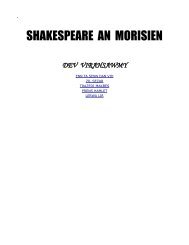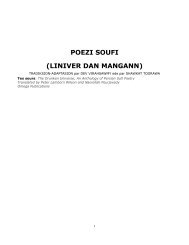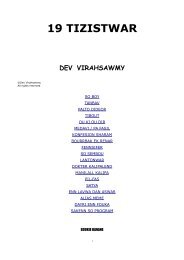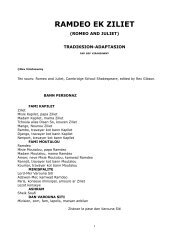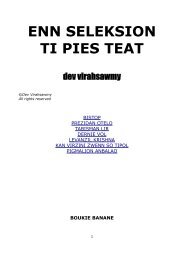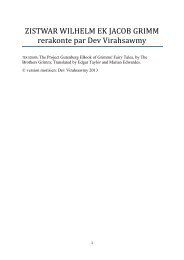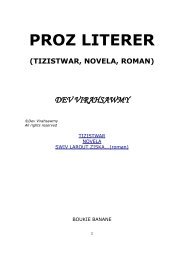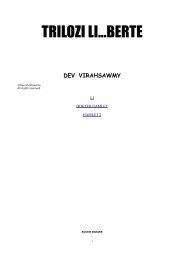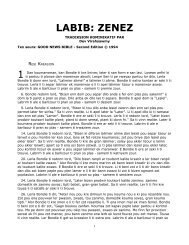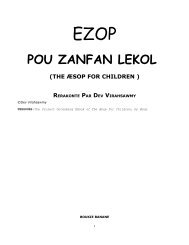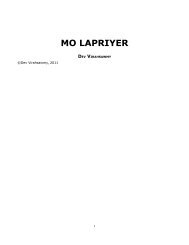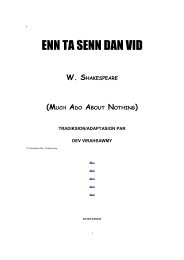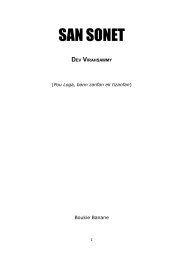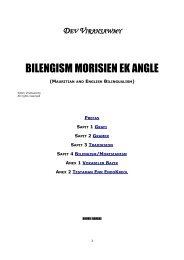UNIVERSAL BILINGUAL FUNCTIONAL LITERACY - lakaz
UNIVERSAL BILINGUAL FUNCTIONAL LITERACY - lakaz
UNIVERSAL BILINGUAL FUNCTIONAL LITERACY - lakaz
Create successful ePaper yourself
Turn your PDF publications into a flip-book with our unique Google optimized e-Paper software.
Applied wholesale of course, it can also be boring for many learners and a quick look at foreign language<br />
course books from the 1950s and 1960s, for example, will soon reveal the non-communicative nature of the<br />
language used. Using the more enlightened principles of the Communicative Approach, however, and<br />
combining these with the systematic approach of Grammar Translation, may well be the perfect combination<br />
for many learners. On the one hand they have motivating communicative activities that help to promote their<br />
fluency and, on the other, they gradually acquire a sound and accurate basis in the grammar of the language.<br />
This combined approach is reflected in many of the EFL course books currently being published and, amongst<br />
other things, suggests that the Grammar Translation method, far from being dead, is very much alive and<br />
kicking as we enter the 21st century.<br />
Without a sound knowledge of the grammatical basis of the language it can be argued that the learner is in<br />
possession of nothing more than a selection of communicative phrases which are perfectly adequate for basic<br />
communication but which will be found wanting when the learner is required to perform any kind of<br />
sophisticated linguistic task.”<br />
It must be emphasised here that there is no single method which can stand on its own. Classroom situations<br />
demand flexibility, versatility and pragmatism. A blend of GT and the communicative method is what we<br />
strongly recommend.<br />
A quick look at certain features of Morisien and English will show potentials and limitations of GT.<br />
WORD ORDER<br />
Generally speaking both Morisien and English use a similar order of words in a sentence.<br />
Mo pe asiz lor enn ros. (Pronoun+verb+adverbial)<br />
I am sitting on a stone. (Pronoun+verb+adverbial)<br />
But with adjectives there is a difference. In English adjectives are prenominal while in Morisien there<br />
are prenominal and postnominal adjectives.<br />
A beautiful girl; an intelligent girl...<br />
Enn zoli tifi; enn tifi entelizan...<br />
In both languages adverbs behave in the same way:<br />
Sentence adverbs or adverbials may be realised at the beginning or at the end of sentences.<br />
Yer mo ti al get li/ mo ti al get li yer<br />
Yesterday I went to see him/her / I went to see him/her yesterday<br />
Adverbs which modify adjectives precede them:<br />
Very clever/ bien malen<br />
Adverbs which modify verbs succeed them:<br />
Run fast/ galoup vit<br />
GENDER<br />
In both languages gender is sex-based and is not grammaticalised as in French.<br />
TENSE AND ASPECT MARKERS<br />
Both languages use tense and aspect markers:<br />
MORISIEN Marker Tan ek Aspe ENGLISH Tense and aspect<br />
markers<br />
Bala manz dipen. Prezan Bala eats bread. Present tense<br />
Bala pe manz dipen. Prezan progresif Bala is eating bread. Present continuous<br />
Bala finn manz dipen. Prezan perfektif Bala has eaten bread. Present perfect<br />
Bala ti manz dipen. Pase Bala ate bread. Past tense<br />
Bala ti pe manz dipen. Pase progresif Bala was eating bread. Past continuous<br />
Bala ti finn manz dipen. Pase perfektif Bala had eaten bread. Past perfect<br />
Bala pou manz dipen. Fitir Bala will eat bread. Future tense<br />
Bala ti pou manz dipen... Kondisionel Bala would eat bread... Conditional<br />
6



